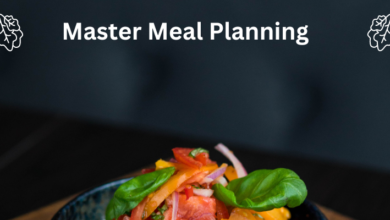Why Broccoli is a Healthy Food

Broccoli, a green vegetable that belongs to the cruciferous family, is often hailed as a superfood due to its numerous health benefits. It is packed with essential vitamins, minerals, fiber, and antioxidants, making it a nutritious addition to any diet. In this article, we will delve into the reasons why broccoli is a healthy food and how it can contribute to your overall well-being.
Nutritional Benefits of Broccoli
Broccoli is a powerhouse of nutrition, offering a wide range of essential nutrients that are crucial for maintaining optimal health. Here are some of the key nutritional benefits of broccoli:
High in Vitamins and Minerals
Broccoli is a rich source of vitamins and minerals that are essential for various bodily functions. It is particularly high in vitamin C, vitamin K, vitamin A, and folate. Vitamin C is known for its immune-boosting properties, while vitamin K is important for bone health. Vitamin A is essential for healthy vision and immune function, and folate is crucial for cell growth and repair.
Rich in Fiber
Fiber is an important component of a healthy diet, and broccoli is an excellent source of dietary fiber. Fiber aids in digestion promote satiety and help regulate blood sugar levels. It also supports heart health by reducing cholesterol levels in the blood.
Low in Calories
If you’re watching your calorie intake, broccoli is a great option. It is low in calories, making it an ideal choice for weight management. Additionally, the high fiber content in broccoli helps you feel fuller for longer, which can prevent overeating.
High in Antioxidants
Broccoli is packed with antioxidants, which are compounds that help protect cells from damage caused by free radicals. Free extremists are destructive atoms that can harm cells and add to the advancement of persistent infections. The antioxidants in broccoli, such as sulforaphane, indole-3-carbinol, and quercetin, have been linked to various health benefits, including reducing the risk of cancer and promoting heart health.
Health Benefits of Broccoli
The nutritional benefits of broccoli translate into numerous health benefits. Here are some of the ways broccoli can promote your well-being:
Supports Digestive Health
The high fiber content in broccoli promotes digestive health by aiding in regular bowel movements and preventing constipation. It also provides prebiotics, which is beneficial for the growth of healthy gut bacteria, promoting a healthy gut microbiome.
Boosts Immune System
Broccoli is a rich source of vitamin C, which is known for its immune-boosting properties. Vitamin C helps strengthen the immune system and supports the body’s defense against infections and diseases. Regular consumption of broccoli can help improve your immune response and keep you healthy.
Promotes Heart Health
The antioxidants and fiber in broccoli have been shown to have heart-healthy benefits. The antioxidants help reduce oxidative stress and inflammation, which are risk factors for heart disease. The fiber in broccoli also helps lower cholesterol levels, which can reduce the risk of heart disease.
Supports Bone Health
Broccoli is a decent wellspring of calcium, which is fundamental for solid bones and teeth. It also contains vitamin K, which plays a role in bone metabolism and helps improve bone density. Regular consumption of broccoli can contribute to better bone health, especially in older adults who may be at risk of osteoporosis.
Helps with Detoxification
Broccoli contains compounds like glucosinolates and sulfur, which support the body’s detoxification processes. These compounds help neutralize and eliminate harmful toxins from the body, promoting liver health and overall detoxification.
How to Incorporate Broccoli into Your Diet
Adding broccoli to your diet is easy and delicious. Here are some ways you can incorporate this healthy vegetable into your meals:
Cooking Methods
- Steaming: Steaming broccoli helps retain its nutrients and preserves its vibrant green color. Simply steam broccoli florets for a few minutes until they are tender but still crisp.
- Roasting: Roasting broccoli in the oven with a little olive oil, salt, and pepper adds a delicious caramelized flavor to the vegetable. Simply toss broccoli florets in olive oil and seasonings, then roast in the oven until crispy.
- Stir-frying: Stir-frying broccoli with other vegetables, lean protein, and a flavorful sauce makes for a quick and nutritious meal. Heat a little oil in a pan, add broccoli florets and other ingredients, and stir-fry until tender.
Recipes and Meal Ideas
- Broccoli and Cheddar Soup: Blend steamed broccoli with vegetable broth, cheddar cheese, and seasonings to make a creamy and flavorful soup.
- Broccoli and Quinoa Salad: Toss cooked quinoa with steamed broccoli, cherry tomatoes, red onion, and a tangy vinaigrette for a nutritious and satisfying salad.
- Chicken and Broccoli Stir-Fry: Stir-fry chicken breast, broccoli, carrots, and bell peppers in a flavorful sauce, and serve over brown rice for a healthy and delicious meal.
With its versatility and mild taste, broccoli can be easily incorporated into a variety of dishes to add a nutritious boost to your meals.
Common Myths and Misconceptions about Broccoli
Despite its many health benefits, broccoli has some common myths and misconceptions associated with it. Let’s debunk a few of them:
Taste and Texture
Myth: Broccoli is bland and boring. Reality: Broccoli can be delicious when prepared properly. Steaming, roasting, or stir-frying with flavorful ingredients can enhance its taste and texture, making it a delicious addition to meals.
Cooking Tips
Myth: Overcooking broccoli destroys its nutrients. Reality: While overcooking broccoli can lead to some nutrient loss, it is still a healthy vegetable to eat. Steaming or roasting broccoli for a short duration can help retain its nutrients while keeping it tender-crisp.
Conclusion
In conclusion, broccoli is a nutritious and healthy food that offers a wide range of health benefits. It is packed with essential vitamins, minerals, fiber, and antioxidants that support overall health and well-being. Incorporating broccoli into your diet regularly can help boost your immune system, promote heart health, support bone health, aid in detoxification, and contribute to a well-rounded and balanced diet.
So, go ahead and enjoy the versatility of broccoli by trying out different cooking methods and recipes to make this healthy vegetable a regular part of your meals. Remember to consult with your healthcare provider if you have any specific health concerns or medical conditions before making significant changes to your diet.




